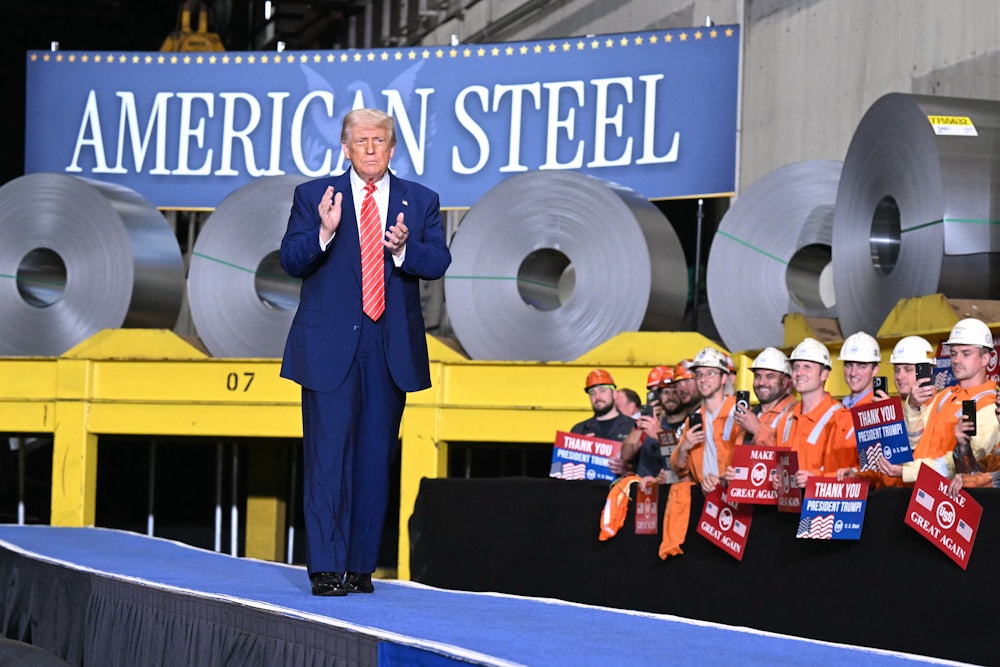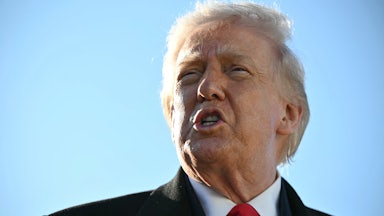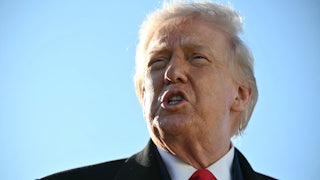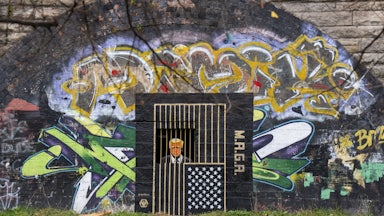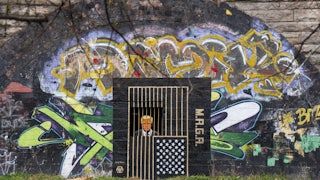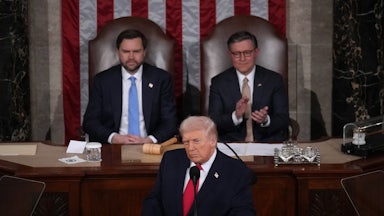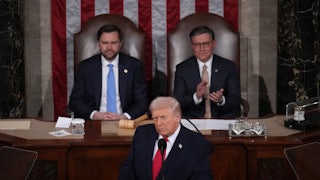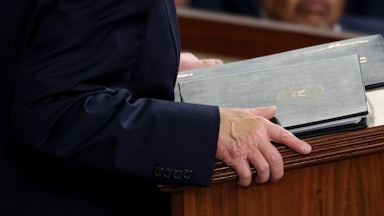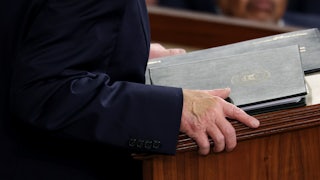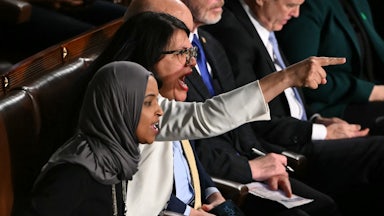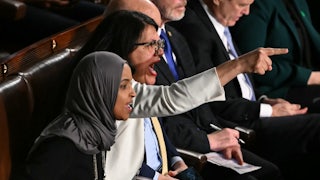The same Trump administration that labels its Democratic opponents “communists” recently acquired (in perpetuity!) a government ownership stake in United States Steel. Just as a stopped clock will give the correct time twice a day, this leftish maneuver—one might even call it socialist—represents a promising new experiment in regulatory policy.
I know, I know, I can’t believe either that I’m saying something nice about the worst presidency in American history. But I can explain. As a condition of approving Nippon Steel’s acquisition of U.S. Steel, which was finalized last week, the Trump administration acquired for the federal government a “golden share” in the company that allows the feds to block plant closures, offshoring, and the like. Conservatives aren’t taking this well. “Nationalization is against the American capitalist spirit,” wrote an apoplectic Andy Kessler on The Wall Street Journal’s editorial page. “Terminally flawed,” opined The Washington Post’s editorialists, fulfilling billionaire Jeff Bezos’s mandate that the paper never cease propagandizing for unregulated free markets.
We’ve seen scant commentary, though, from liberals and the left. I presume that’s because this cohort’s first instinct is to read Trump’s golden share as some sort of con. That certainly was my first reaction. Further cause for suspicion was that the deal was negotiated by Commerce Secretary Howard Lutnick, the single most obnoxious billionaire oligarch in a Trump administration that’s loaded with them. (See my recent TNR piece, “How the Billionaires Took Over.”)
But while I retain robust misgivings about expanding our kleptocrat president’s power over corporations—more on those in a moment—I cannot, as someone who favors stronger government limits on corporate power, look this gift horse in the mouth.
The phrase “golden share” sounds like something naughty in the Steele dossier, but it actually refers to a special kind of share in a publicly held corporation that grants the shareholder majority power over certain specified decisions. When the golden shareholder is a government, the corporation becomes something akin to a public utility, though how much so depends on the extent of the powers outlined in the share agreement. The leftist Roosevelt Institute has talked up golden shares, plausibly, as a tool to advance green technology, to increase wages, and to prevent bank failures (and has extended cautious praise for Trump’s U.S. Steel arrangement).*
Strangely, this instrument of state socialism is the handiwork of the conservative British Prime Minister Margaret Thatcher. You may recall that during the 1980s, Thatcher privatized dozens of government-owned enterprises, including British Airways, British Telecom, and British Steel. To get these privatizations through Parliament, Thatcher had to agree that the United Kingdom would maintain golden shares in these corporations. The policy justification, ironically, was to keep these corporations out of foreign hands—but I see no reason why golden shares can’t also be used to limit potential dire consequences once foreign ownership is a done deal.
The U.K. later relinquished most of its golden shares, either because these were time-limited (as the U.S. Steel golden share is not) or because the European Union, to which the United Kingdom no longer belongs, objected to them. Today most of the U.K.’s remaining golden shares are in defense-related firms like BAE Systems and Rolls Royce (which in addition to making fancy cars builds parts for fighter jets, battleships, and submarines).
Trump’s justification for keeping a golden share in U.S. Steel is similarly based on national security, with the terms of the share drawn up in something called a national security agreement, or NSA. That the NSA has not been made public was cited by Robert Kuttner and Laura Ingraham as reason enough to continue opposing the Nippon Steel–U.S. Steel merger. (Industrial policy makes strange bedfellows.) Now that the merger is completed, though, I see no downside to liberals embracing the golden share, at least tentatively, as a promising new direction for government regulation. The worst-case scenario is that the agreement doesn’t really say what Lutnick claims it says, in which case we can revert to identifying Lutnick and Trump as liars.
Here’s what Luttnick said the golden share prevents, in a June 14 tweet about the agreement:
• Relocate U.S. Steel’s headquarters from Pittsburgh, Pennsylvania.
• Redomicile outside the United States
• Change the name of the company from U.S. Steel
• Reduce, waive, or delay the $14 billion of Near-Term investments into U.S. Steel
• Transfer production or jobs outside the United States
• Close or idle plants before certain timeframes other than normal course temporary idling for safety, upgrades, etc.
• Other protections regarding employee salaries, anti-dumping pricing, raw materials and sourcing outside the U.S.
These are all very Trumpy, excepting the reference to salaries, something that never previously interested our commander in chief (and may not still). But they represent significant concessions by Nippon, especially when you remember that this agreement will remain in place long after Trump departs the White House.
The missing piece is a pledge to honor the United Steelworkers’ labor contract and to keep U.S. Steel a union shop. Understandably, this omission did not please the United Steelworkers union, which continues to oppose the merger. The union is also skeptical that Trump will act to prevent plant closures. He may not; but future presidents may. Given Trump’s terrible track record on labor rights, this is about as good a deal as the Steelworkers were ever going to get. But yes, President Joe Biden would have cut a much better deal for the union.
It was Biden, of course, who first blocked the Nippon–U.S. Steel merger. That was a political maneuver made during election season in spite of a reportedly divided assessment by the Treasury’s Committee on Foreign Investment in the United States, which was tasked with assessing the national security implications. The truth is there aren’t any.
We still think of U.S. Steel as the colossus it was in the 1950s, but it’s no longer even the biggest steelmaker inside the United States; at least three American competitors (Nucor, Steel Dynamics, Cleveland-Cliffs) bring in more revenue, and two (Nucor and Cleveland-Cliffs) employ significantly more workers. Granted, Nucor and Steel Dynamics are non-union shops, but Cleveland-Cliffs, like U.S. Steel, operates under a United Steelworkers contract. My main feeling about Nippon wanting to own U.S. Steel is: Thank goodness someone wants it—and thank goodness the foreign nation in question is one of America’s most reliable allies.
I do worry that there’s some potential for mischief by Trump. I don’t think he would use his golden share to play union buster, but then I also didn’t think he would use his B-2 stealth bombers to play bunker buster. Conceivably, Trump might try to meddle with the hiring of Latinos or African Americans at U.S. Steel as part of his racist crusade against DEI. Outright extortion is also possible: Trump might demand that Nippon buy Trump meme coins or other cybercurrency, or book rooms in Trump resorts, or buy stock in Truth Social … or else. The man is, after all, a convicted felon. One would hope that corporate executives at Nippon or union officials at U.S. Steel would blow the whistle. But there’s no guarantee.
It’s a calculated risk. The upside is that we get to find out whether golden shares are a plausible tool to keep corporate power and the American oligarchy in check, if not under Trump (that hardly seems likely) then under his successors. And if socialism catches on among Trump supporters, we may make Democrats out of MAGA cultists yet.
Update, June 26: A new U.S. Steel filing to the SEC furnishes more detail about the terms of the golden share; the Roosevelt Institute’s Todd Tucker has some useful comment on it here.
* This article previously misstated the Roosevelt Institute’s position on Trump’s golden share. It also misinterpreted the SEC filing describing the golden share; although the legal language repeatedly mentions Trump by name, the agreement does not expire when he leaves office.
